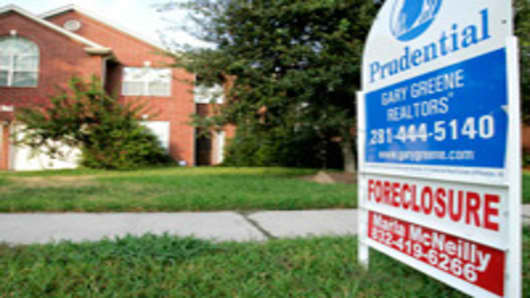The much-anticipated wave of adjustable-rate-mortgage resets—which are beginning to hit many homeowners now—may not be as devastating to the housing market as experts had feared.
"I don't see much of a payment shock as long as interest rates remain low," says Frank Nothaft, chief economist at Freddie Mac. "The Fed has been moderating policy and keeping rates low for treasurys that serve as an index for ARMs. I think that will continue into the end of 2011."
Over the last two years, manyindustry analysts were expecting the large number of ongoing ARM termchanges to have a crushing effect on the housing market, with increases on interest rate payments—as well as principal—forcing thousands more foreclosures than are already taking place.
But historically low interest ratesare reversing that expectation. In fact, Nothaft says, some ARM mortgage holders might even see their interest rates lowered when the loan terms change.
"That's not to say everyone with an ARM will see their rates go down, but some will as the rates have continued to fall for those ARM indexes," Nothaft adds.
And even with increases in principal—which are included in some ARMs—homeowners might not take a much of a hit, says Marc Schwaber, corporate development manager mortgage for First Choice Loan Services in New Jersey.
"One side may go up, the principal, but the other side, the interest rates, will more than likely go down with the new terms," Schwaber goes on to say. "I think it balances out more or less."
Still, some analysts are continuing to warn about the dangers for ARM borrowers and the housing market.
"A lot of ARMs were interest-only payments and the principal balances are going to increase as the loan terms restructure in the days ahead," says Rick Sharga, vice president of RealtyTrac.com. "People who have those type of ARMs are going to see big increases in their housing costs. I don' think many of them will be able to afford it."
Starting this quarter, nearly one million adjustable rate mortgages are estimated to be reset into higher payments over the next three years, with some 750,000 of them adjusting now and through 2011. They will reach a peak next year of 54,000 adjustments just in the month of August.
Sharga says about half of all those ARM loans will see their principal costs rise—what's called recasting—along with possible interest rate hikes or resetting.
"About $300 billion in ARMs will reset and recast to higher payments in 2011," Sharga goes on to say. "I think this is a potentially toxic situation for homeowners and the market with more foreclosures on the line."
Option ARMs primarily offer homeowners loans at a much lower initial interest than a fixed mortgage, for say a 3-6 year period. Buyers can even get interest only ARM loans and skip principal payments for a time. But the terms eventually change and both principal and/or interest rates usually goes up.
While some experts might downplay the effect of ARM resets, option ARM loans have been somewhat of a thorn in housing's side during the real estate crisis. That's because their delinquency rate is still high as the terms change—as is the foreclosure rate.
Is Refinancing the Answer?
Delinquencies of more than 60 days for payment option ARMs originated in 2006 have risen from 23.26 percent in 2008-2009 to 42.44 percent, according to a report from Deutsche Bank. For 2007 ARMs, the delinquency rate has climbed from 10.1 percent to 35.25 percent, according to the same study.
And foreclosure rates for some ARM loans have reached levels of up to84 percent in some areas, like Clevleand, Ohio.
Some $750 billion worth of ARMs were originated between 2004 and 2008—with most targeted to home buyers who wanted lower payments while hoping to re-finance on a rise in housing prices—and to those who planned to sell the house before the new terms set in.
But housing prices have fallen over the last two years and continue to seek a bottom in many parts of the county. As a result, thousands of homes have lost their equity and homeowners are "underwater" or owe more than the home is worth.
Falling prices—along with tougher underwriting regulations—has made re-financing more difficult for ARM borrowers and also made it tougher to sell the home at any kind of profit.
For those holding ARM loans, the answers to the term changes aren't necessarily simple. Some anlsysts say it might be best just sit tight when the readjustment comes.
"I think the ARM payments will pretty much be the same with the lower interest rates when they reset or recast," says Schawber. "There's no rush to do anything as I see it."
"Some $750 billion worth of ARMs were originated between 2004 and 2008—with most targeted to home buyers who wanted the lower payments while hoping to re-finance on an increase in housing prices, or to those who planned to sell the house before the new terms set in."
Other analysts say re-financing is the answer, if borrowers can qualifty and can get through the maze of paperwork.
"People should be looking into longer term rates if they plan to stay in the home more than two years," says Alan Rosenbaum, president and ceo of Guardhill Financial, a mortgage lending firm. "Even if their ARM is three percent, they can get a better deal with a long term mortgatge right now with rates so low."
"Refinancing is difficult as they now ask you 40 quesitons instead of just 10 like they used to and home prices are a problem," says Eric Silverman, co-founder of Silverman, a real estate develoment firm in Jersey City, New Jersey. "But it can be done, if you have enough equity in your home."
As for new homebuyers, many seem to be avoiding ARMs altogether.
"By far, the loan of choice is still the fixed rate," says Freddie Mac's Nothaft. "Around 80 percent of all new loans are longer term, fixed rate. There are ARMs for sure and with the lower interest rates, the so called ARM teaser rates or introductory rates are very low. But there are not as many of these done as in the past. People are more conservative these days."
As for getting into this ARMs mess in the first place, there's plenty of blame, according to RealtyTrac's Sharga.
"It's not easy to be sympathetic to the banks who pushed these loans, and of course, homebuyers did over reach," Sharga says. "A lot of people were told their home values would go up. That hasn't happened."





